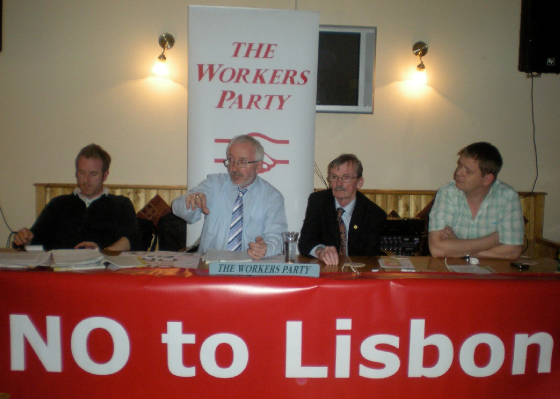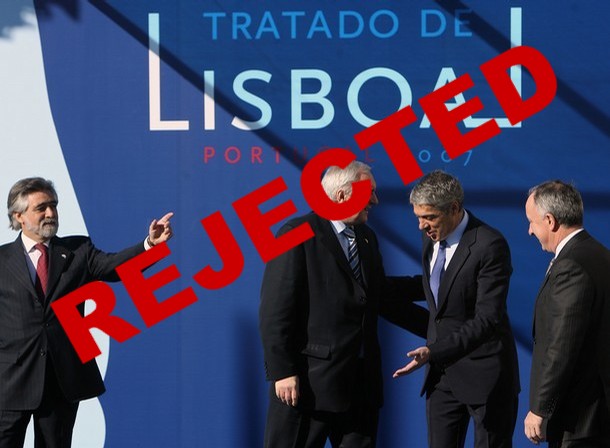|
The Workers' Party played an active role in campaigning for a No vote in the undemocratic 2nd Referendum on the Lisbon
Treaty. We distributed thousands of leaflets to homes all over the country as well as meeting people at shopping centres,
workplaces, and public events. We also organised many public meetings across the country and participated in
many other "broad left" meetings and activities.

Photo above shows the formal launch of the Workers' Party NO to Lisbon campaign at Buswell's Hotel, Dublin on Wednesday,
10th September 2009. Left to Right: Malachy Steenson, Campaign Director, Dublin; Party President Michael Finnegan and
Padraig Mannion, National Campaign Director

On Wednesday September 23rd the Workers Party in Dundlak held a public meeting in the Commercial Club to oppose
the Lisbon Treaty. The Platform (L to R) Mark Walsh (PbPA), Padraig Mannion (Workers Party), Peter Short who chaired
the meeting, and Cllr Tomas Sharkey (Sinn Fein).

Padraig Mannion (centre) Workers Party Anti-Lisbon Campaign Director addresses an anti-Lisbon public meeting in Waterford
on Tuesday 15th September. The meeting was organised by the Unite Trade Union.
Also in the picture are Cllr David Cullinane (Sinn Fein) and Tommy Hogan (Unite) who chaired the meeting.

The platform at the Waterford Anti-Lisbon public meeting on Sept 15th.
(L to R): Cllr David Cullinane (Sinn Fein), Padraig Mannion (Workers' Party), Tommy Hogan (Unite), Patricia McKenna (People's
Movement), and former Danish MEP Jens-Peter Bonde (June Movement).

Pictured Above: Cllr Ted Tynan, chairing a Workers' Party Anti-Lisbon Public Meeting in the Victoria Hotel, Cork on Wednesday
16th September and Padraig Mannion (Anti-Lisbon Treaty Campaign Director) addressing the meeting.

|
The Workers’ Party of Ireland
Lisbon Treaty Referendum 2008 Analysis
The Lisbon treaty
has been defeated by the Irish people. This is a notable victory for democracy not only in Ireland but right across the 27
countries which constitute the present EU. It shows once again the clear divide that exists between the views, hopes and aspirations
of the peoples of the EU and the plans of the tiny military, business and bureaucratic elite who dominate the structures and
decision-making processes within the EU.
Preparing for the campaign: The Workers’
Party analysis was that the Lisbon Treaty was seriously dangerous in many aspects especially in the areas of democracy, workers’
rights, militarism, relations with the developing world, and the privatisation of essential public services. Our analysis
also was that the treaty would have practically 100% support of the political establishment, the business establishment, and
many of the mass organisations controlled by the social democrats. We also knew that for this treaty the parliamentary section
of the Green Party (now in government for the first time ever) would opportunistically change sides and support Lisbon.
The political
left is both weak and splintered in Ireland. At the same time it was important that there was as coherent and strong a left
opposition to the treaty as possible. Therefore the Workers Party was one of the early affiliates to the Campaign Against
the EU Treaty (CAEUC) campaign group and participated fully in all their activities. The strength of the CAEUC group lay in
the fact that it did unite all the various left groups on a common platform, and because this common platform existed a lot
of the bickering and divisiveness that had characterised previous campaigns did not surface in public.
The Campaign: The Workers’ Party produced two editions
of our newspaper “Look Left”, thousands of posters, and more than 100,000 leaflets for mass distribution during
the campaign. We concentrated on the working-class heartlands of all the major cities and towns as well as some events at
shopping centres, sporting events and cultural events.
The Party organised
many public meetings. In organising our meetings we made a very deliberate decision to engage in public debate within these
meetings. Therefore at practically all our meetings we had speakers from other left organisations but we also brought people
from the Yes camp, and specifically from the social democratic Labour Party. ….
we believed, …. that there was a serious division between the views of grassroots Labour Party and trade union
members and the positions of the leaders of the Labour party and some prominent people within the Trade Union leadership.
The presence of official Labour Party representatives on our platforms allowed us to appeal directly to Labour Party members,
supporters and voters and all the available evidence shows that we were successful in this strategy.
The Result: The referendum proposal was clearly
defeated on a turnout of well over 50% of the electorate. It was defeated in all the regions and also in the vast bulk of
the parliamentary constituencies.
A constituency
analysis shows that areas of wealth and opulence supported the treaty while the working class / lower middle class, the farming,
the fishing constituencies all defeated the referendum proposal. In many large working class areas the No vote had a 2:1 majority.
Issues raised by Libertas –corporation tax and tax harmonisation – are issues in the high-income areas which all
voted resoundingly yes. Their target audience rejected their message and the vast majority of business organisations publicly
backed the yes side.
Conclusion: Politically
we must hold to the position that the Lisbon treaty is now dead and cannot be resurrected in some revised form. This is exactly
what happened after the French and Dutch rejection of the EU Constitution. The Lisbon Reform treaty was the EU constitution
reheated. The danger now is that some sections of the Irish No campaign, specifically Sinn Fein, believe it is possible to
get a better deal. The EU bureaucrats may well facilitate this position and offer some changes, such as the retention of the
commissioners in order to make a second referendum acceptable. The problem with this approach is that it does nothing to challenge
the fundamental problems with the EU - its anti democratic and unaccountable character, increasing militarisation, neo liberal
economic agenda etc.
In short the EU is a capitalist and imperialist construct and no amount of tinkering around the edges will change
that.
The Workers Party of Ireland, 20th
June 2008
| |
download the full document
|

